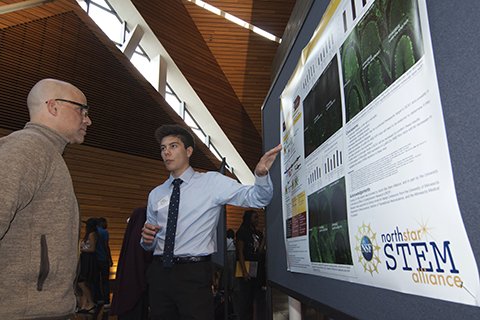University awarded $3.7M to boost retention of underrepresented students in STEM

Initiative essential to statewide efforts to close opportunity gaps
MINNEAPOLIS / ST. PAUL (07/25/2017) — The National Science Foundation (NSF) has awarded a $3.7 million grant to the University of Minnesota Twin Cities to further efforts to increase the number of students of color and American Indian students pursuing science, technology, engineering and mathematics (STEM) programs of study and careers.
The five-year grant, which runs through 2022, was awarded as part of the NSF’s Louis Stokes Alliance for Minority Participation (LSAMP) program, which is called the North Star STEM Alliance in Minnesota. The University of Minnesota received the initial five-year LSAMP award in 2007, followed by a renewal from 2012-2017.
The initiative is intended to attract and maximize the number of African-American, Hispanic/Latino, Native American, Alaska Native and Pacific Islander students receiving baccalaureate degrees in STEM fields.
Vice President for Equity and Diversity Katrice Albert, who serves as principal investigator for the grant, stresses that initiatives like the North Star STEM Alliance are essential to statewide efforts to close opportunity gaps. “Higher education must be at the forefront of building pipelines for a top-flight, diverse workforce,” said Albert. “This grant will help the University of Minnesota and its partners ensure that a new generation of STEM thought leaders is well prepared and positioned to actively engage in and transform our communities, our state, and our professions.”
By 2012, the Alliance had achieved 293 graduates per year, exceeding the goal of doubling the number of minority STEM graduates from the baseline of 136 graduates per year in 2004-2005. As of the 2015-2016 academic year, the Alliance has achieved 444 graduates per year. It is now challenged to attain 756 graduates per year by 2022.
Led by the U of M Twin Cities, the Alliance will use the funding to further expand on its efforts to recruit, engage, and graduate underrepresented minorities (URM) pursuing bachelor’s degrees in STEM and build a greater collective impact on diversity and inclusion among its fourteen collegiate partner institutions and three community partner organizations. In addition to the U of M Twin Cities, the North Star STEM Alliance includes two additional University of Minnesota campuses (Duluth and Morris); seven Minnesota State Colleges and Universities; and tribal and private colleges. Community partners include the Science Museum of Minnesota, Minnesota High Tech Association, and the Minnesota Education Equity Partnership.
Co-principal investigators are Samuel Mukasa, dean of the U of M College of Science and Engineering; Robert McMaster, U of M vice provost and dean of undergraduate education; and Moin Syed, associate professor of psychology on the Twin Cities campus. A fourth co-principal investigator from the senior administration of Minnesota State will also join the leadership team.
Under the funded project, Alliance students benefit by experiencing undergraduate research locally, nationally, and internationally; presenting research at professional conferences; receiving faculty and peer mentoring; and developing professionally for graduate school and careers in industry. The funding also supports additional components of the Alliance’s work, including, but not limited to: a research study to investigate the role of student research experiences in identity development and workshops relating Native knowledge and Western research methods.
In support of this goal, a local grant funded by the 3M Foundation complements the Alliance grant by creating opportunities for community college students to prepare effectively for transfer to 4-year institutions. Participating campuses include U of M Twin Cities, Augsburg College, Metropolitan State University, Century College, Minneapolis Community and Technical College and Saint Paul College.
“Partner institutions—public, private, and tribal institutions and community organizations-- have all contributed to building our strong alliance over the past decade,” said Anne Hornickel, Alliance program director. “This award allows us to advance our collective effort toward creating better institutional practices that retain students in STEM majors. In the next five years we will focus retention efforts on students who transfer to complete their bachelor’s degrees.”
